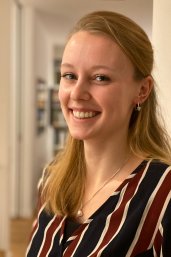Eveline Neele on the influence of governments on legal systems and UUCePP's impact on her future plans
What kind of mind-set is needed to carry out ground-breaking research as we do at UUCePP?
UUCePP researchers introduce themselves in brief interviews conducted by Elisabetta Manunza and Fredo Schotanus. Today: student-assistant Eveline Neele, employed from January 13, 2020.

‘Who’ and ‘what’ are you?
My name is Eveline Neele, I am a student-assistant at the Centre for Public Procurement and a Master's student in corporate law.
The influence of governments on legal systems fascinates me; the interface between private and public law as well. A bachelor course on public economic law revealed to me that these are features of public procurement law. At UUCePP I learned that to understand public procurement law, knowledge of other legal fields is needed, such as European law, private law, corporate law, competition law, international law and procedural law. The approach for this field of law at UUCePP is instrumental: public procurement is seen as an instrument governments can use to achieve societal goals. All these aspects appeal to me enormously, so I was happy to start as a student assistant.
What do you work on, and why?
Recently I have been working on the launch of the new centre. It is an honour to be a part of the UUCePP team at this extraordinary moment. As a student-assistant I am involved in many research projects of UUCePP. I experience the great impact public procurement law has on a wide range of societal fields. An interesting aspect of Dutch public procurement law is that it is strongly affected by European law, which means there is a lot to investigate.
One of the lessons I learned at UUCePP is the societal impact of the results of scientific research. Through its research projects UUCePP (in)directly contributes to a better world. For example by investigating the influence of the law on government policy and the other way around. Becoming conscious of this potential societal impact of scientific research played an important role in my future choices. One of them concerns my decision to start with the Legal Research Master next year.
What makes you get out of bed in the morning? And is this different because of the COVID-19 crisis?
I've always been curious; I get out of bed to learn. At UUCePP I have plenty of opportunity to learn. Everyone takes the time to share new findings and ideas with the team, which gives me a good insight in public procurement law and helps me to find where my own passion lies.
Another good reason to get out of bed is my Master’s thesis. My research focusses on the Dutch ‘403-statement’, the statement in which a parent company accepts liability for a subsidiary company. The statement is named after Section 403 of Book 2 of the Dutch Civil Code, in which it is established. Specifically, I look at the conditions that apply when a parent company has revoked a 403-statement and wants to be relieved from liability for the subsidiary. In my research thesis, I do not look solely at legal arguments, but I also take commercial and practical considerations into account. In this method, I recognize the methodology of the researchers at UUCePP. They also look beyond the law and how the rules work ‘in the real world’.

Is there nevertheless something you appreciate in these changing circumstances?
I appreciate the increased solidarity and sense of community. I think the COVID-19 crisis has demonstrated that people have a natural inclination to help each other, even - or perhaps especially – during crises. Responding to the needs of others - ‘helping attitude’ - is at the base of how UUCePP researchers operate. For example, Willem Janssen recorded a special podcast episode on the consequences of the COVID-19 crisis in the field of public procurement law. The ultimate goal is shaping a just and sustainable world through public procurement.
Due to the changed circumstances during the crisis, I started to spend more time in nature. Diminishing other activities and avoiding crowded places, I discovered beautiful spots around Utrecht. On the picture you will find an example: the beautiful area around Schalkwijk!
Should we go back to our old way of life after the crisis, or not?
Personally, I would love to get my normal life back. I very much look forward to meeting my friends and family spontaneously again. I also miss working at the UUCePP institute. Talking to the other UUCePP members on Microsoft team every week is totally different than approaching them in real life.
Structuring the day and taking enough breaks while staying at home is hard to manage. The goal is to finish working and studying at a fixed time each day. After that, running helps to clear my mind.
Which book has impressed you the most, has shaped you, and would you read 100 more times? And why?
‘Chernobyl Prayer’ by Svetlana Alexievich is an extraordinary novel, as all other Alexievich’s novels are as well. Chernobyl Prayer consists of monologues from testimonies of survivors of the Chernobyl nuclear disaster of 26 April 1986. The stories express fear, anger, frustration and uncertainty, but also love, courage and humour. Although this is a completely different disaster, I see parallels with the current COVID-19 crisis. The coronavirus is an invisible and frightening enemy, just like nuclear radiation is.

